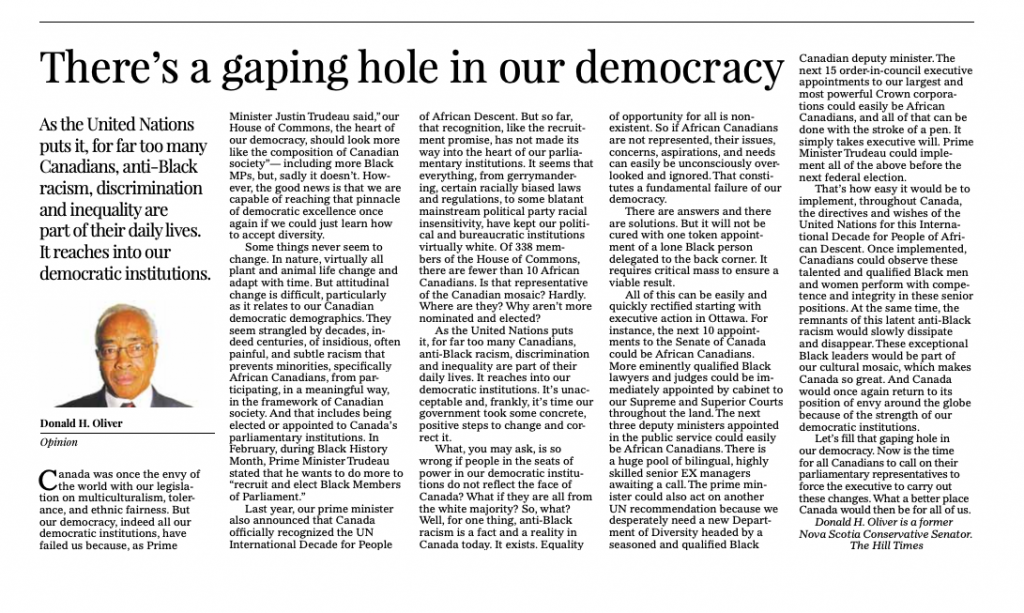
This Op-Ed originally appeared in The Hill Times on June 19, 2019.
As the United Nations puts it, for far too many Canadians, anti-Black racism, discrimination and inequality are part of their daily lives. It reaches into our democratic institutions.
Canada was once the envy of the world with our legislation on multiculturalism, tolerance, and ethnic fairness. But our democracy, indeed all our democratic institutions, have failed us because, as Prime Minister Justin Trudeau said,” our House of Commons, the heart of our democracy, should look more like the composition of Canadian society”— including more Black MPs, but, sadly it doesn’t. However, the good news is that we are capable of reaching that pinnacle of democratic excellence once again if we could just learn how to accept diversity.
Some things never seem to change. In nature, virtually all plant and animal life change and adapt with time. But attitudinal change is difficult, particularly as it relates to our Canadian democratic demographics. They seem strangled by decades, indeed centuries, of insidious, often painful, and subtle racism that prevents minorities, specifically African Canadians, from participating, in a meaningful way, in the framework of Canadian society. And that includes being elected or appointed to Canada’s parliamentary institutions. In February, during Black History Month, Prime Minister Trudeau stated that he wants to do more to “recruit and elect Black Members of Parliament.”
Last year, our prime minister also announced that Canada officially recognized the UN International Decade for People of African Descent. But so far, that recognition, like the recruitment promise, has not made its way into the heart of our parliamentary institutions. It seems that everything, from gerrymandering, certain racially biased laws and regulations, to some blatant mainstream political party racial insensitivity, have kept our political and bureaucratic institutions virtually white. Of 338 members of the House of Commons, there are fewer than 10 African Canadians. Is that representative of the Canadian mosaic? Hardly. Where are they? Why aren’t more nominated and elected?
As the United Nations puts it, for far too many Canadians, anti-Black racism, discrimination and inequality are part of their daily lives. It reaches into our democratic institutions. It’s unacceptable and, frankly, it’s time our government took some concrete, positive steps to change and correct it.
What, you may ask, is so wrong if people in the seats of power in our democratic institutions do not reflect the face of Canada? What if they are all from the white majority? So, what? Well, for one thing, anti-Black racism is a fact and a reality in Canada today. It exists. Equality of opportunity for all is non-existent. So if African Canadians are not represented, their issues, concerns, aspirations, and needs can easily be unconsciously overlooked and ignored. That constitutes a fundamental failure of our democracy.
There are answers and there are solutions. But it will not be cured with one token appointment of a lone Black person delegated to the back corner. It requires critical mass to ensure a viable result.
All of this can be easily and quickly rectified starting with executive action in Ottawa. For instance, the next 10 appointments to the Senate of Canada could be African Canadians. More eminently qualified Black lawyers and judges could be immediately appointed by cabinet to our Supreme and Superior Courts throughout the land. The next three deputy ministers appointed in the public service could easily be African Canadians. There is a huge pool of bilingual, highly skilled senior EX managers awaiting a call. The prime minister could also act on another UN recommendation because we desperately need a new Department of Diversity headed by a seasoned and qualified Black Canadian deputy minister. The next 15 order-in-council executive appointments to our largest and most powerful Crown corporations could easily be African Canadians, and all of that can be done with the stroke of a pen. It simply takes executive will. Prime Minister Trudeau could implement all of the above before the next federal election.
That’s how easy it would be to implement, throughout Canada, the directives and wishes of the United Nations for this International Decade for People of African Descent. Once implemented, Canadians could observe these talented and qualified Black men and women perform with competence and integrity in these senior positions. At the same time, the remnants of this latent anti-Black racism would slowly dissipate and disappear. These exceptional Black leaders would be part of our cultural mosaic, which makes Canada so great. And Canada would once again return to its position of envy around the globe because of the strength of our democratic institutions.
Let’s fill that gaping hole in our democracy. Now is the time for all Canadians to call on their parliamentary representatives to force the executive to carry out these changes. What a better place Canada would then be for all of us.